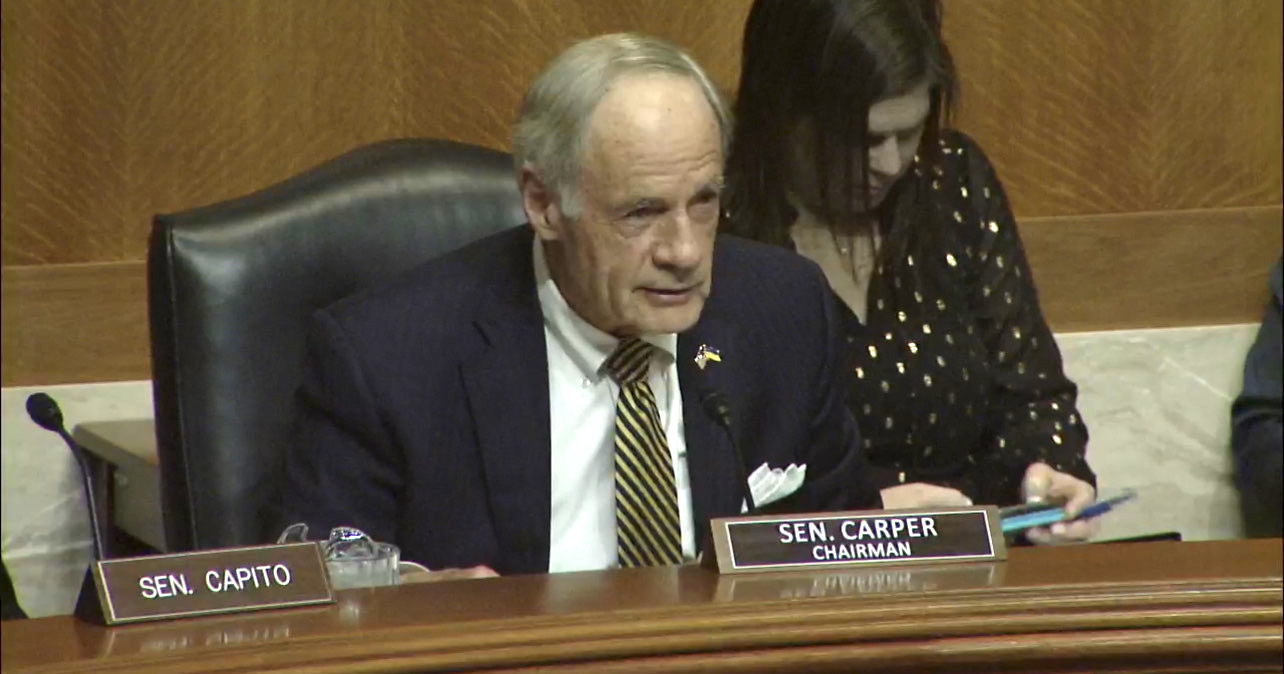
Courtesy of the U.S. Senate Committee on Environment & Public Works

Courtesy of the U.S. Senate Committee on Environment & Public Works
By Haajrah Gilani
The United States experiences major natural disasters about five times more frequently than it did in the 1980s, Sen. Tom Carper, D-Del. said in a senate hearing on Wednesday. This statement cited a National Climate Assessment released by the Biden administration on Tuesday.
“Adjusting for inflation, in the 1980s, the United States experienced a $1 billion disaster every four months, on average,” Carper said. “Today, there is one every three weeks.”
This finding set the tone for the Senate Environment and Public Works committee hearing by underscoring the importance of slashing greenhouse gas pollution from industries. Whether it was about cement, steel or timber, senators raised concerns about what decarbonizing industries could mean for the economy of their home states, and the country, with the backdrop of a looming climate crisis.
“We’re all experiencing climate change now through increasingly devastating extreme weather events throughout our planet,” Carper said. “To slow climate change, we need to slash greenhouse gas emissions and one-third of the solution lies in our industrial sector.”
Carper said the decarbonization of industries that produce essential products like steel, cement or aluminum, would play a crucial part in reducing America’s greenhouse gas emissions. For Carper, meeting climate goals also posed an opportunity for economic advancement.
The panelists at the hearing represented various approaches to industrial decarbonization, including switching from fossil fuels to clean hydrogen and adopting new cement manufacturing processes.
But not all senators viewed industrial decarbonization as a step towards more opportunity.
During the hearing, Sen. John Fetterman, D-Pa., expressed concern for the Edgar Thomson Steel Works, which he called the last functional steel mill in the western part of his state.
He shared that in his conversations with United States Steel, he questioned their stated initiatives to decarbonize steel.
“To me, decarbonizing the steel industry would be like having a steakhouse that you don’t have a dead cow [at]. It seems kind of incompatible there,” Fetterman said.
Fetterman later said that the Edgar Thomson plant, which is owned by U.S. Steel, was supposed to have a $1.5 billion expansion. According to Fetterman, that project was ultimately canceled and U.S. Steel instead said it wanted to prioritize decarbonization. Fetterman said he’s worried the result will mean fewer good jobs for the people of Pennsylvania.
“Facilities, like Edgar Thomson, might just get chucked,” Fetterman said. “And you’re pretending that they’re all gonna get great new jobs and great kinds of things. It’s just not realistic.”
A panelist at the hearing, Leah Ellis, the CEO and cofounder of Sublime Systems, Inc., said that her organization, which commercializes a process to make low-carbon cement, signed a partnership agreement focused on high quality jobs with United Steelworkers.
Ellis wrote in her testimony that the production of novel clean industrial technology can spur jobs for all skill and education levels, although some jobs would require specific training and expertise.
“A portion of Sublime’s advanced manufacturing technology jobs require experience in clean technology concepts and techniques not commonly found in today’s workforce or education curricula, and thus require additional workforce training that some unions are very well positioned to support training, as well as community colleges and public schools,” Ellis’ testimony said.
Carper emphasized the role of industries that produce essential products in his closing statements.
“By producing materials in cleaner ways, we can reduce emissions throughout supply chains. And, by investing in the industries that are producing lower carbon materials for our buildings, our roads, and electric vehicles, we can help support our clean energy transition,” he said.